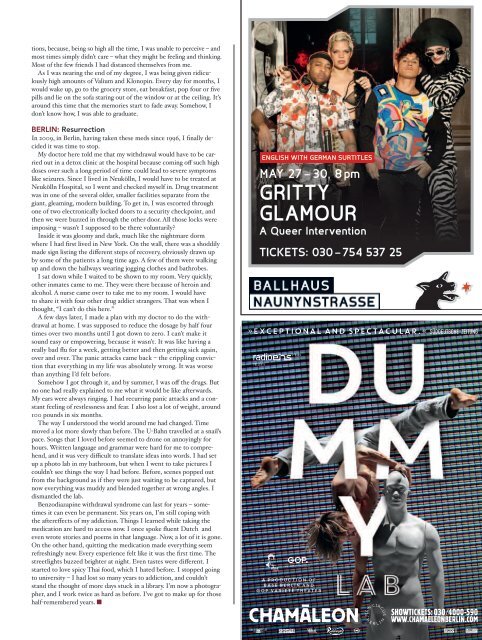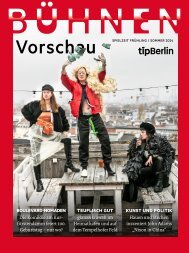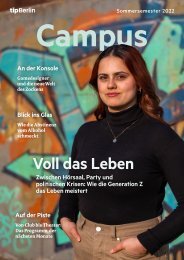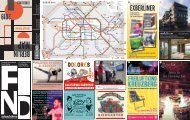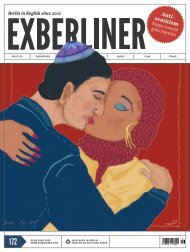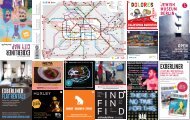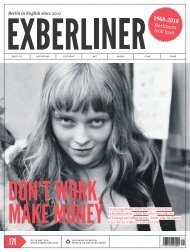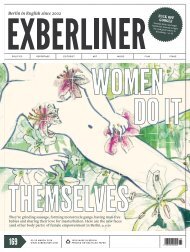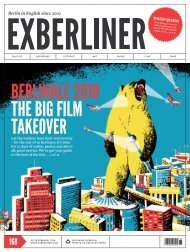Create successful ePaper yourself
Turn your PDF publications into a flip-book with our unique Google optimized e-Paper software.
tions, because, being so high all the time, I was unable to perceive – and<br />
most times simply didn’t care – what they might be feeling and thinking.<br />
Most of the few friends I had distanced themselves from me.<br />
As I was nearing the end of my degree, I was being given ridiculously<br />
high amounts of Valium and Klonopin. Every day for months, I<br />
would wake up, go to the grocery store, eat breakfast, pop four or five<br />
pills and lie on the sofa staring out of the window or at the ceiling. It’s<br />
around this time that the memories start to fade away. Somehow, I<br />
don’t know how, I was able to graduate.<br />
BERLIN: Resurrection<br />
In 2009, in Berlin, having taken these meds since 1996, I finally decided<br />
it was time to stop.<br />
My doctor here told me that my withdrawal would have to be carried<br />
out in a detox clinic at the hospital because coming off such high<br />
doses over such a long period of time could lead to severe symptoms<br />
like seizures. Since I lived in Neukölln, I would have to be treated at<br />
Neukölln Hospital, so I went and checked myself in. Drug treatment<br />
was in one of the several older, smaller facilities separate from the<br />
giant, gleaming, modern building. To get in, I was escorted through<br />
one of two electronically locked doors to a security checkpoint, and<br />
then we were buzzed in through the other door. All those locks were<br />
imposing – wasn’t I supposed to be there voluntarily?<br />
Inside it was gloomy and dark, much like the nightmare dorm<br />
where I had first lived in New York. On the wall, there was a shoddily<br />
made sign listing the different steps of recovery, obviously drawn up<br />
by some of the patients a long time ago. A few of them were walking<br />
up and down the hallways wearing jogging clothes and bathrobes.<br />
I sat down while I waited to be shown to my room. Very quickly,<br />
other inmates came to me. They were there because of heroin and<br />
alcohol. A nurse came over to take me to my room. I would have<br />
to share it with four other drug addict strangers. That was when I<br />
thought, “I can’t do this here.”<br />
A few days later, I made a plan with my doctor to do the withdrawal<br />
at home. I was supposed to reduce the dosage by half four<br />
times over two months until I got down to zero. I can’t make it<br />
sound easy or empowering, because it wasn’t. It was like having a<br />
really bad flu for a week, getting better and then getting sick again,<br />
over and over. The panic attacks came back – the crippling conviction<br />
that everything in my life was absolutely wrong. It was worse<br />
than anything I’d felt before.<br />
Somehow I got through it, and by summer, I was off the drugs. But<br />
no one had really explained to me what it would be like afterwards.<br />
My ears were always ringing. I had recurring panic attacks and a constant<br />
feeling of restlessness and fear. I also lost a lot of weight, around<br />
100 pounds in six months.<br />
The way I understood the world around me had changed. Time<br />
moved a lot more slowly than before. The U-Bahn travelled at a snail’s<br />
pace. Songs that I loved before seemed to drone on annoyingly for<br />
hours. Written language and grammar were hard for me to comprehend,<br />
and it was very difficult to translate ideas into words. I had set<br />
up a photo lab in my bathroom, but when I went to take pictures I<br />
couldn’t see things the way I had before. Before, scenes popped out<br />
from the background as if they were just waiting to be captured, but<br />
now everything was muddy and blended together at wrong angles. I<br />
dismantled the lab.<br />
Benzodiazapine withdrawal syndrome can last for years – sometimes<br />
it can even be permanent. Six years on, I’m still coping with<br />
the aftereffects of my addiction. Things I learned while taking the<br />
medication are hard to access now. I once spoke fluent Dutch and<br />
even wrote stories and poems in that language. Now, a lot of it is gone.<br />
On the other hand, quitting the medication made everything seem<br />
refreshingly new. Every experience felt like it was the first time. The<br />
streetlights buzzed brighter at night. Even tastes were different. I<br />
started to love spicy Thai food, which I hated before. I stopped going<br />
to university – I had lost so many years to addiction, and couldn’t<br />
stand the thought of more days stuck in a library. I’m now a photographer,<br />
and I work twice as hard as before. I’ve got to make up for those<br />
half-remembered years. n<br />
ENGLISH WITH GERMAN SURTITLES<br />
MAY 27 - 30, 8pm<br />
GRITTY<br />
GLAMOUR<br />
A Queer Intervention<br />
TICKETS: 030 - 754 537 25<br />
17


